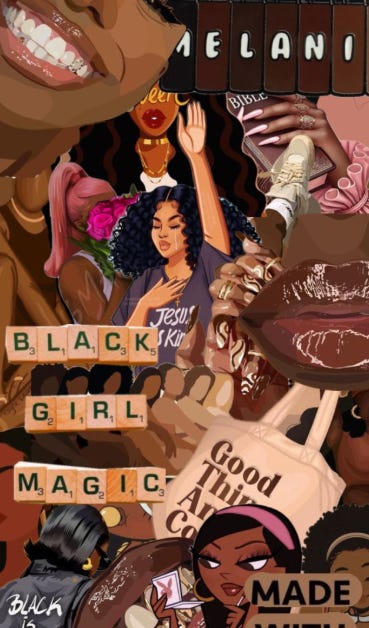Black Femininity, Black Spinsterhood, and Juneteenth
From Infinity to Infinity...
What people often describe as “attitude” or even “aggression” in Black women—what they mock, side-eye, or ridicule when it comes to how we express ourselves, I would name as a form of Black femininity.
Everyone seems eager to define masculinity and femininity, especially femininity. And when femininity doesn’t fit a narrow, mainstream ideal, people are quick to dismiss it. But femininity isn’t one-size-fits-all. It shifts with culture, history, geography, and spirit.
Black femininity is expressive.
It’s loud.
It’s direct.
It’s poetic.
It’s spiritual.
It’s sometimes weary, sometimes joyful, but always present.
A lot of folks, both outside the Black community and inside it, act like they don’t understand or don’t like the way Black women express ourselves. But I’m here to say: the mannerisms, the attitude, the cadence, the side-eyes, the laughs, the silence, the hair, the nails, the slang, the prayer hands, the whole thing, that’s feminine expression. That is Black womanhood in motion.
People recognize cultural difference in most contexts. They know a French woman, a Japanese woman, an Indian woman will express themselves differently. But somehow, Black femininity is seen as either a joke or a threat. That’s not by accident. That’s the result of a long history of racialized gender expectations rooted in white supremacy.
And yet… people try to imitate us. They steal the language, the gestures, the fashion, but the essence never fully transfers. It’s often a mockery, not a tribute.
There’s a persistent expectation that Black women should act like white women. To be soft in the way white femininity is defined. To be submissive, sweet, quiet, and accommodating also, in the way white femininity is defined. But that’s not our culture. That’s not our inheritance. Our femininity developed under very different conditions and that difference should be respected, not erased. Our submissiveness, sweet, quiet and accommodating nature manifests itself differently than it does in others. And that is not bad; it’s not masculine. It’s unique and beautiful in so many ways.
And then there’s the Black spinster.
The woman who’s chosen or been placed in a life that’s unmarried, often childfree, deeply self-sufficient, and often misunderstood.
She too is part of this tapestry.
Her independence isn’t the absence of love; it’s a declaration of self.
Her solitude isn’t bitterness, it’s power.
Her life isn’t “incomplete,” it’s full of her own making.
Black spinsterhood is a unique expression of Black femininity, one that refuses to shrink itself for male validation or traditional expectations.
It’s rooted in survival, but also joy.
It’s shaped by history, but also vision.
And it is absolutely feminine, just on our terms.
Today is Juneteenth.
A celebration of Black freedom. Of emancipation long overdue.
But let’s not forget: Black women were there, too.
Cooking over open fires with barely enough to feed themselves.
Hiding escapees beneath floorboards, hearts pounding in the dark.
Praying by moonlight, calling down protection on our children.
Fighting with whatever we had — words, work, rage, resolve.
Writing truths that shook the foundation of a stolen nation.
Weeping for sons and daughters sold and never seen again.
Healing the wounded — body and spirit — with roots, herbs, and hands.
And always, always holding it down.
Our freedom was never handed to them.
We made it, daily, out of scraps, sweat, and spirit.
Today, we celebrate us, too.
Let’s honor us.
Let’s honor ourselves.
Let’s remember that our mannerisms, our makeup, our hair, our sayings, our stories,
They’re not “too much.”
They are culture.
They are history.
They are feminine.
They are sacred.
They are ours.
That’s not just Black femininity.
It’s Feminology.
.
.






